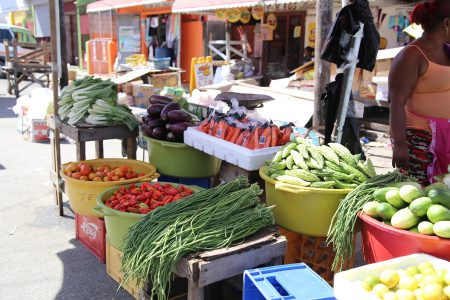With some shoppers noticing that their vegetables have been much more perishable than usual, Chief Executive Officer of the National Agricultural Research and Extension Institute (NAREI) Dr Oudho Homenauth says it could be as a result of farmers using too much nitrogen fertiliser.
“When I buy me greens now for the week, it ain’t lasting. The bora, pumpkin, everything spoiling and getting soft, soft,” a shopper at the Bourda Market told Sunday Stabroek.
Another pointed out that in the past if one kept vegetables too long in the refrigerator, they usually lost moisture and became dry but now they are becoming “slush” after a few days.
One vendor in the market admitted to this newspaper that he has seen this trend and has received complaints.


“That is why now if you see I only selling pumpkin and provision because it ain’t making sense and I only buying from one set of people,” the vendor said.
Another vendor said it could be how the vegetables are being stored but added that he had not noticed a shorter shelf life nor had he received complaints.
Others refused to engage this newspaper on the issue but shoppers in general had one consensus: that the vegetables are not lasting as long as they used to. “This thing is really upsetting and what I start doing is buying almost every day. That is hard but it better than me losing money,” a shopper said.
While some have speculated that the use of pesticides could be a cause, Dr Homenauth put this fear to rest and said the only explanation could be the excessive use of nitrogen. He said while he himself has not made the observation nor has he received any complaints, based on what was described to him by this newspaper, the excessive use of the nitrogen fertiliser is the obvious conclusion.
Too much nitrogen
Dr Homenauth noted that if too much nitrogen fertiliser is used, the vegetables would grow faster and larger than normal.
“What happens is because it gets that fertiliser, I would say excessive fertiliser, the vegetable would obviously get bigger and what happens there is really the cells within the fruit that expands and that expansion comes about because of water, excess water,” he explained, while noting vegetables also look greener.
“So, what I suspect has been happening is that the cells themselves, because of too much nitrogen fertiliser, have expanded in the vegetable making them larger,” he said.
According to Dr Homenauth, when the fruit or vegetable is harvested and the temperature changes the cells collapse and this is what he suspects is happening.
Asked if this harmful, Dr Homenauth responded in the negative, before adding that it is just a case of the vegetable losing moisture.
“The cells would start contracting and it would lose the moisture and that is why I suspect you get this collapse that is the only reason I could proffer. In other words, what happens is there is a reduction in the shelf life of these commodities,” he said.
He reiterated that nothing will be wrong with the fruit or vegetable as a result of it collapsing when cooked right away; it would have a lot of water.
According to Dr Homenauth, farmers would normally use three different fertilisers: nitrogen, phosphorus, and potassium. Nitrogen is used for growth and development, he explained.
“But it is not harmful; the only thing I am saying they may be using too much of the nitrogen…and customers would lose out because the things spoiling,” he said.
He stressed that farmers need to use the fertiliser efficiently and according to recommendations and there would be no issues.
He said definitively that the short shelf life of the fruits and vegetables has nothing to do with pesticides.
Dr Homenauth said he usually visits the markets and does visual checks and he is happy that even in the dry weather there is no shortage and the vegetables “look good” although the prices are fluctuating.





